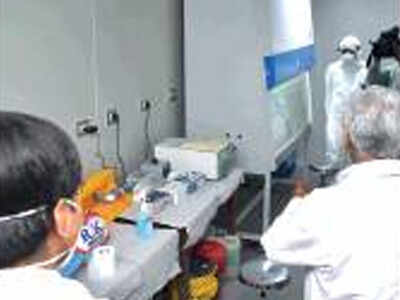
LUCKNOW: Chief minister Yogi Adityanath has given his nod for setting up of first of its kind highly advanced laboratory which apart from detecting novel coronavirus infection would also be able to identify a biological warfare to enable authorities to initiate remedial steps. This idea of setting up of this advanced laboratory on the pattern of National Institute of Virology, Pune at KGMU here is part of the CM's multi-pronged strategy for speedy development of medical infrastructure in the state for fighting the coronavirus pandemic.
Chairing a high-level meeting of health and medical officers here on Tuesday, the CM okayed a proposal for setting up an ultramodern moleculor laboratory, equipped for biosafety and biosecurity at par with the NIV, Pune in the state. The lab would be set up with an estimated outlay of Rs 150 crore, said a senior officer who attended the meeting convened by the CM. His focus was on making available testing facilities at all government run medical colleges and science institutes. At divisional headquarters which do not have medical colleges district hospitals should be upgraded to start test facility, he added.
For developing testing facilities and setting up more laboratories, the CM has set up a committee which would be headed by principal secretary, medical education, Rajneesh Dubey.
Sources said that the CM himself reviewed the novel coronavirus testing facilities at medical colleges and other institutes and asked authorities concerned to set up an advanced laboratory not only for Covid-19 testing, but it should also be capable of detecting a bio attack. On other decisions of the CM, additional chief secretary, home, Awanish Awasthi said that he had laid stress on setting up molecular laboratories at all 27 medical colleges of the state and institutions at the earliest.
Later, speaking to TOI, principal secretary, medical education and chairman of the newly formed committee Rajneesh Dubey, said that the BSL-3 labs would have advanced facilities, including negative air pressure technique, which would protect the research staff from catching any infection as the airflow would be restricted at the exit points.
Chairing a high-level meeting of health and medical officers here on Tuesday, the CM okayed a proposal for setting up an ultramodern moleculor laboratory, equipped for biosafety and biosecurity at par with the NIV, Pune in the state. The lab would be set up with an estimated outlay of Rs 150 crore, said a senior officer who attended the meeting convened by the CM. His focus was on making available testing facilities at all government run medical colleges and science institutes. At divisional headquarters which do not have medical colleges district hospitals should be upgraded to start test facility, he added.
For developing testing facilities and setting up more laboratories, the CM has set up a committee which would be headed by principal secretary, medical education, Rajneesh Dubey.
Sources said that the CM himself reviewed the novel coronavirus testing facilities at medical colleges and other institutes and asked authorities concerned to set up an advanced laboratory not only for Covid-19 testing, but it should also be capable of detecting a bio attack. On other decisions of the CM, additional chief secretary, home, Awanish Awasthi said that he had laid stress on setting up molecular laboratories at all 27 medical colleges of the state and institutions at the earliest.
Later, speaking to TOI, principal secretary, medical education and chairman of the newly formed committee Rajneesh Dubey, said that the BSL-3 labs would have advanced facilities, including negative air pressure technique, which would protect the research staff from catching any infection as the airflow would be restricted at the exit points.

Coronavirus outbreak
Trending Topics
LATEST VIDEOS
City
 Delhi Health Minister meets 82-year-old cured COVID-19 patient
Delhi Health Minister meets 82-year-old cured COVID-19 patient  Centre considering states' request to extend lockdown: Sources
Centre considering states' request to extend lockdown: Sources  COVID-19: Ranchi admin bans movement of persons, vehicles after 2 novel coronavirus cases reported
COVID-19: Ranchi admin bans movement of persons, vehicles after 2 novel coronavirus cases reported  COVID-19: Educational institutions will be closed till Apr 30 in state, says Meghalaya Deputy CM
COVID-19: Educational institutions will be closed till Apr 30 in state, says Meghalaya Deputy CM
More from TOI
Navbharat Times
Featured Today in Travel
Quick Links
Kerala Coronavirus Helpline NumberHaryana Coronavirus Helpline NumberUP Coronavirus Helpline NumberBareilly NewsBhopal NewsCoronavirus in DelhiCoronavirus in HyderabadCoronavirus in IndiaCoronavirus symptomsCoronavirusRajasthan Coronavirus Helpline NumberAditya ThackerayShiv SenaFire in MumbaiAP Coronavirus Helpline NumberArvind KejriwalJammu Kashmir Coronavirus Helpline NumberSrinagar encounter
Get the app





